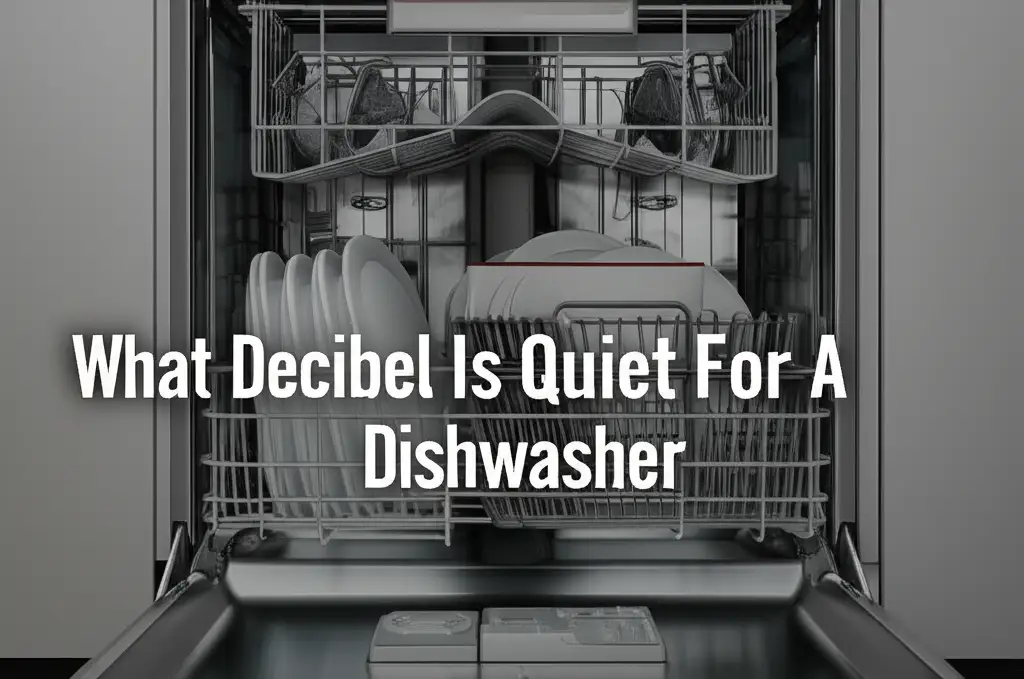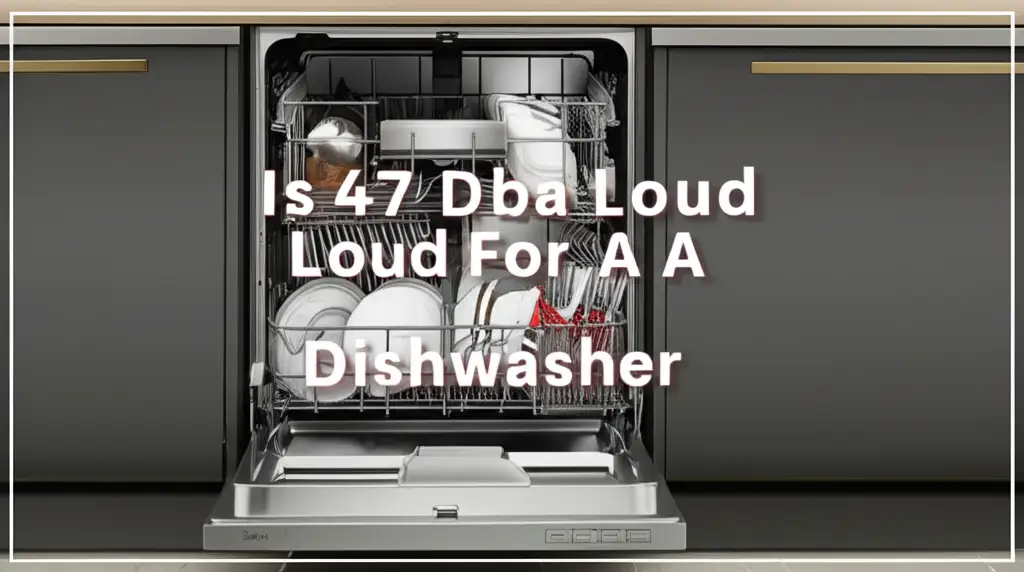· Elira Thomsen · Home Appliance Guide · 16 min read
Does A Dishwasher Need Insulation Around It

Does Your Dishwasher Need More Insulation for Quiet and Efficiency?
Imagine a quiet kitchen while your dishwasher cleans. Is this possible? Many homeowners wonder about the benefits of adding insulation around their dishwasher. This question often comes up during installation or when an old dishwasher makes too much noise. Understanding dishwasher insulation helps you make informed choices.
We will explore what insulation does for your dishwasher. We will look at how it reduces noise and improves energy use. You will learn about different insulation materials. We will also cover how to check your current setup. This guide provides clear steps for potential DIY projects. We will also discuss when to call a professional. Get ready to transform your kitchen experience.
Takeaway: Key Benefits of Dishwasher Insulation
- Significant Noise Reduction: Insulation helps absorb sound waves. This makes your kitchen quieter during wash cycles.
- Improved Energy Efficiency: It traps heat inside the dishwasher. This allows water to stay hot longer.
- Faster Drying Performance: Better heat retention also assists with drying dishes more effectively.
- Enhanced Component Protection: Insulation adds a protective barrier around the appliance’s internal parts.
- Increased Appliance Longevity: Keeping heat inside and protecting components can extend the dishwasher’s lifespan.
Clear Answer: Does a Dishwasher Need Insulation Around It?
Yes, a dishwasher typically benefits from insulation around it. Modern dishwashers come with factory-installed insulation to reduce noise and improve energy efficiency. Adding more or ensuring existing insulation is intact further enhances quiet operation and helps the appliance retain heat, leading to better drying and lower energy bills.
Understanding Dishwasher Insulation: The Basics
When we talk about insulation for a dishwasher, we mean materials placed around its exterior. These materials serve two primary functions. They reduce noise produced during wash cycles. They also help the dishwasher retain heat. Both functions are vital for a good kitchen experience.
Dishwashers create noise from motors, water sprays, and draining. Insulation acts as a sound barrier. It absorbs these sounds before they escape into your kitchen. This creates a more peaceful home environment. A quiet appliance is always welcome.
Heat retention is another key benefit. Dishwashers use hot water to clean and sanitize dishes. Insulation helps keep this heat inside the tub. This means the water stays hotter for longer. It also assists in the drying process. Good insulation contributes to lower energy consumption. This saves you money on utility bills.
Most new dishwashers include some insulation from the factory. This factory insulation often consists of a blanket or sprayed-on material. Its quality varies between models and brands. Understanding these basics helps you decide if more insulation is needed. It sets the stage for a quieter, more efficient appliance.
Why Dishwashers Need Noise Reduction: The Sound Barrier
Dishwashers can be surprisingly loud. The sounds come from various operations. You hear water filling, spraying, and draining. The pump and motor also contribute to the noise. These sounds can disrupt quiet moments in your home. They can make conversations difficult.
Noise levels are measured in decibels (dB). A quiet dishwasher operates below 45 dB. Louder models might reach 60 dB or more. Even a few decibels can make a big difference in perceived noise. Lower decibel ratings indicate a quieter machine. This leads to a more pleasant kitchen.
Insulation works as a sound barrier. It absorbs sound waves rather than letting them travel. Materials like bitumen sheets, fiberglass, and even cotton shoddy excel at this. They convert sound energy into minimal heat. This prevents noise from radiating into your living space.
A well-insulated dishwasher makes less noise during its cycle. This allows you to run it anytime. You can even run it at night. It will not disturb your sleep or family activities. Reducing dishwasher noise greatly improves home comfort. It truly transforms the kitchen environment.
Insulation and Energy Efficiency: Keeping the Heat In
Dishwasher insulation plays a significant role in energy efficiency. Dishwashers use hot water for effective cleaning. They also use heat for drying. Keeping this heat contained inside the appliance is crucial. Insulation acts as a thermal barrier.
When a dishwasher lacks proper insulation, heat escapes. The appliance then works harder to maintain water temperature. This means its heating element cycles more often. More frequent heating uses more electricity. Your utility bills then increase unnecessarily.
Good insulation prevents this heat loss. It traps the warmth inside the wash tub. This allows the hot water to remain at a consistent temperature. It also helps with the heated drying cycle. Dishes dry more effectively with less additional energy. This reduces the dishwasher’s overall energy consumption.
Many modern dishwashers, especially high-end models, focus on energy efficiency. They use advanced insulation techniques. This helps them earn Energy Star ratings. For instance, understanding does Bosch dishwasher heat its own water highlights how some models manage heat. Their efficiency often ties directly to their insulation quality. Investing in good insulation contributes to lower long-term operating costs. It also reduces your environmental footprint.
Types of Dishwasher Insulation Materials: What’s Used?
Dishwasher insulation comes in several forms. Manufacturers use different materials. Each material has unique properties. They each offer specific benefits for noise reduction and thermal retention. Knowing these types helps you understand your dishwasher’s performance.
One common material is bitumen sheets. These are dense, rubber-like pads. Manufacturers often stick them to the outer walls of the dishwasher tub. Bitumen excels at dampening vibrations and absorbing sound. It is a very effective sound barrier.
Fiberglass insulation is another popular choice. This material comes in blanket form. It wraps around the dishwasher’s sides and top. Fiberglass is excellent for thermal insulation. It also provides good sound absorption. It is often found in both new and older models.
Some dishwashers use cotton shoddy. This is a recycled material, often from denim or other fabrics. It is environmentally friendly. Cotton shoddy provides both sound dampening and thermal insulation. It is a good, eco-conscious option.
Newer, higher-end models might use spray foam insulation. This material expands to fill gaps. It creates a seamless, airtight seal. Spray foam offers superior thermal and acoustic properties. It creates a very quiet and energy-efficient appliance. Understanding these materials helps you assess your dishwasher.
Factory-Installed vs. Aftermarket Insulation: What’s the Difference?
Most dishwashers today come with factory-installed insulation. This insulation is a standard part of their design. Manufacturers integrate it during assembly. The type and amount of factory insulation vary. It depends on the model’s price point and intended performance.
Entry-level dishwashers often have minimal factory insulation. This might be a thin blanket or simple bitumen pads. These provide basic noise and heat control. Mid-range models typically offer better quality insulation. High-end dishwashers often boast advanced multi-layer insulation systems. These systems aim for very low decibel ratings. They also maximize energy efficiency. If you are debating do I need a stainless steel tub dishwasher, consider that stainless tubs often pair with better insulation for quietness and drying.
Aftermarket insulation refers to materials you add yourself after purchase. People add this for various reasons. They might have an older, noisy dishwasher. They might also want to improve a new, less insulated model. Aftermarket options include self-adhesive sound dampening mats. These are made from rubber or asphalt. They also include insulation blankets made from fiberglass or other acoustic materials.
Adding aftermarket insulation can significantly improve performance. It helps reduce noise further. It can also enhance heat retention. This is a common DIY project for those seeking a quieter kitchen. It also helps with better energy use. Always make sure you can access the dishwasher’s outer panels safely for any additions.
Assessing Your Dishwasher’s Current Insulation: A Quick Check
How do you know if your dishwasher needs more insulation? You can perform a few simple checks. These steps help you understand its current insulation status. They also help identify areas for improvement.
First, listen to your dishwasher during a cycle. Is it excessively loud? Do you hear clanking, humming, or splashing clearly outside the cabinet? High noise levels often indicate poor insulation. A quiet dishwasher should operate smoothly in the background.
Next, feel the outer panels of the dishwasher during a heated cycle. Do they feel warm or hot to the touch? If significant heat escapes, your insulation might be insufficient. The heat should stay largely contained within the tub. Excessive exterior heat means energy is wasted.
You can also try to visually inspect the insulation. This usually involves pulling the dishwasher out from its cabinet. Disconnect power first. Carefully slide the unit out. Look at the sides, top, and bottom. Do you see a blanket, pads, or foam covering the outer tub? Note any gaps, tears, or missing sections. Sometimes, the insulation shifts or degrades over time. This reduces its effectiveness. Knowing what does minimum height for dishwasher mean can also indicate the space available around the appliance, which might impact insulation options.
If you notice these issues, adding or replacing insulation can help. It can make a big difference in noise and efficiency. These simple checks give you clear information. They help you decide your next steps.
DIY Dishwasher Insulation: Step-by-Step Guide
Adding insulation to your dishwasher can be a rewarding DIY project. It helps reduce noise and improve energy efficiency. Before you start, gather your materials. You will need self-adhesive sound dampening mats. You might also need a fiberglass or cotton shoddy insulation blanket.
Step-by-Step Process:
- Disconnect Power and Water: Safety first. Turn off the circuit breaker for the dishwasher. Turn off the water supply valve. This prevents electrical shock and water leaks.
- Pull Out the Dishwasher: Gently unfasten the dishwasher from the countertop. Carefully slide the unit out from its cabinet. Be mindful of hoses and electrical cords. Do not strain them.
- Clean the Surfaces: Use a damp cloth to clean the outer metal surfaces of the dishwasher. Ensure they are free of dust, grease, or debris. This helps adhesive materials stick better.
- Apply Sound Dampening Mats: Cut the self-adhesive mats to fit the sides and top panels. Press them firmly onto the metal. Ensure good contact to maximize vibration dampening. Overlap edges slightly if needed.
- Wrap with Insulation Blanket: If using a blanket, carefully wrap it around the dishwasher’s sides and top. Secure it with foil tape or strong duct tape. Ensure it does not block vents or moving parts. Cut openings for water lines and electrical connections.
- Reinstall the Dishwasher: Carefully slide the dishwasher back into its opening. Reconnect the water supply and drain lines. Plug in the power cord.
- Test the Dishwasher: Turn on the circuit breaker and water supply. Run a test cycle. Listen for noise reduction. Also, check for any leaks. Enjoy your quieter kitchen.
This process can significantly improve your dishwasher’s performance. Always follow safety precautions. Consult your dishwasher manual if you have specific questions about its components.
Professional Dishwasher Installation and Insulation: When to Call an Expert
While DIY insulation is possible, sometimes a professional is the best choice. This is especially true for initial installation or complex insulation needs. Professional installers ensure proper setup from the start. They also handle any insulation requirements correctly.
Reasons to Hire a Professional:
- New Dishwasher Installation: When installing a brand-new unit, professionals ensure it fits correctly. They check for proper water and electrical connections. They can also ensure factory insulation is intact. They also handle electrical concerns, such as ensuring does a dishwasher receptacle need to be GFCI, for safety compliance.
- Complex Noise Issues: If your dishwasher has unusual or excessive noise, a professional can diagnose the cause. It might be insulation, but it could also be a worn-out pump or motor. They can distinguish between these problems.
- Limited Access or Space: Some kitchen layouts make it difficult to pull out a dishwasher. Tight spaces can hinder DIY efforts. Professionals have specialized tools and experience for these situations.
- Warranty Concerns: Improper DIY modifications might void your dishwasher’s warranty. A professional installation or repair can protect your warranty. They use approved methods.
- Safety and Compliance: Professionals understand plumbing and electrical codes. They ensure your dishwasher meets all safety standards. This prevents potential hazards.
Hiring an expert provides peace of mind. They guarantee proper installation and effective insulation. They ensure your dishwasher runs efficiently and safely. This investment can save you time and prevent future problems.
The Impact of Insulation on Dishwasher Performance and Longevity
Insulation does more than just reduce noise and save energy. It also influences your dishwasher’s overall performance. It can even extend its useful life. This often overlooked benefit is significant.
Proper insulation helps maintain a stable internal temperature. Hot water remains hotter longer. This leads to more effective cleaning and sanitization. Dishes come out cleaner and more sterile. This is a primary function of any dishwasher. Efficient heat retention also aids in the drying process. Dishes dry faster and more completely. You avoid damp spots or watermarks.
Beyond temperature, insulation protects internal components. It creates a buffer against external temperature fluctuations. It also dampens vibrations from the motor and pump. These vibrations, over time, can stress internal parts. Reduced vibration means less wear and tear. This helps delicate electronic components last longer.
A well-insulated dishwasher experiences less strain on its heating element. It does not need to work as hard. This reduces the risk of overheating. It also minimizes component burnout. Less stress on parts directly contributes to a longer lifespan for the appliance. Investing in good insulation protects your investment. It ensures your dishwasher performs optimally for many years.
Maintaining Your Dishwasher’s Insulation: Tips for Longevity
Maintaining your dishwasher’s insulation helps it remain effective. Insulation can degrade or shift over time. Regular checks ensure it continues to provide benefits. Proper care helps prolong its life.
Here are some tips for maintaining dishwasher insulation:
- Regular Inspections: Periodically pull out your dishwasher. Check the insulation blanket or pads. Look for tears, sagging, or signs of moisture. Address any issues promptly.
- Keep It Dry: Ensure no leaks are occurring around your dishwasher. Water can damage insulation materials. It can also lead to mold or mildew. Fix leaks immediately.
- Avoid Punctures or Tears: Be careful when moving or working around the dishwasher. Sharp objects can puncture the insulation. Damage reduces its effectiveness.
- Clean Exterior Carefully: When cleaning the exterior of your dishwasher, avoid harsh chemicals. Some cleaners can degrade insulation materials if they seep behind the panels. Use gentle cleaners on the surface only.
- Address Pest Issues: Pests, especially rodents, can nest in or damage insulation. If you have a pest problem, address it quickly. This protects your insulation and appliance.
- Professional Checks During Servicing: When you have your dishwasher professionally serviced, ask them to check the insulation. They can spot issues you might miss. They can also perform minor repairs.
A little attention goes a long way. Keeping your dishwasher’s insulation in good shape maximizes its benefits. It ensures quiet operation and energy savings for years to come. This also contributes to the overall health of your appliance.
Dishwasher Location and Its Effect on Noise
The placement of your dishwasher in the kitchen also influences how much you hear it. While insulation works wonders, the surrounding environment plays a role too. Understanding this can help you achieve maximum quietness.
Dishwashers often sit next to cabinets. These cabinets can act as a natural sound barrier. They help muffle some of the noise. However, thin cabinets or those with empty spaces might not do enough. A solid, well-built cabinet helps absorb more sound.
Walls behind the dishwasher also matter. If the dishwasher backs onto a living area, noise might travel. Consider adding sound-dampening material to the wall behind the appliance. This is another layer of sound control. It creates an even quieter space.
Flooring also plays a part. Hard surfaces like tile or hardwood can reflect sound. This makes a dishwasher seem louder. Softer flooring, like linoleum or rugs in nearby areas, can absorb sound. This helps reduce echoes and overall noise. Think about these factors during kitchen design. They complement your insulation efforts.
Energy Star Ratings and Dishwasher Insulation
When shopping for a new dishwasher, you will often see an Energy Star rating. This rating indicates a product’s energy efficiency. Insulation quality directly impacts this rating. Understanding this connection helps you choose a truly efficient appliance.
Energy Star certified dishwashers meet strict efficiency guidelines. They use less water and less energy. A significant part of their energy efficiency comes from superior insulation. Better insulation means less heat loss during wash and dry cycles. This reduces the need for the heating element to work constantly.
These high-efficiency models often feature advanced insulation materials. They might have multiple layers. They might also use spray foam technology. This design ensures maximum heat retention. It also ensures excellent noise reduction. Such models consume less electricity for heating water. They also dry dishes more effectively without excessive heat.
Choosing an Energy Star dishwasher benefits you in two ways. You save money on utility bills over the appliance’s lifespan. You also contribute to environmental protection. Less energy consumption means a smaller carbon footprint. Always look for the Energy Star label. It is a clear sign of good insulation and overall efficiency.
FAQ Section
Is dishwasher insulation necessary for all models?
Most modern dishwashers include factory insulation. It helps with noise and energy use. While not strictly “necessary” for function, it greatly enhances comfort and efficiency. Older or budget models often benefit most from added insulation due to lower initial quality.
How much noise reduction can I expect from adding insulation?
You can expect a noticeable reduction in noise, often by several decibels. This translates to a quieter kitchen environment. The exact improvement depends on the original noise level and the quality of the added insulation. Many users report a significant difference.
Can insulation help my dishwasher dry dishes better?
Yes, insulation significantly aids drying performance. It helps retain the heat inside the dishwasher tub during the drying cycle. This consistent internal temperature allows dishes to dry more thoroughly and efficiently. You will notice fewer water spots.
What is the typical lifespan of dishwasher insulation?
Factory insulation typically lasts the lifespan of the dishwasher, around 10-15 years. However, it can degrade faster if exposed to leaks, pests, or physical damage. Aftermarket insulation longevity depends on the material and installation quality.
Does adding insulation affect a dishwasher’s warranty?
Adding aftermarket insulation usually does not void your dishwasher’s warranty. This is as long as you do not damage the appliance during the process. Always check your specific manufacturer’s warranty terms. If unsure, consult a professional.
Are there any safety concerns with DIY dishwasher insulation?
The main safety concerns are electrical shock and water leaks. Always disconnect power and water before starting work. Ensure all connections are secure when reinstalling. Use non-flammable insulation materials. If you are uncomfortable, hire a professional.
Conclusion
Deciding whether your dishwasher needs insulation around it ultimately comes down to your desire for a quieter home and lower energy bills. Most modern appliances come with some form of factory insulation. However, many older or budget models can greatly benefit from additional sound dampening and thermal barriers. My experience shows that investing a little time or money in insulation pays off.
Proper dishwasher insulation drastically reduces operational noise. It transforms a noisy kitchen into a peaceful space. It also ensures your appliance runs with optimal energy efficiency. This saves you money on utility costs. From improving wash cycles to extending appliance life, insulation is a powerful upgrade. Whether you choose a DIY approach or hire a professional, enhancing your dishwasher’s insulation is a smart move for any homeowner. Enjoy the quiet and efficiency it brings to your kitchen.
- dishwasher insulation
- quiet dishwasher
- energy efficient appliance
- sound dampening
- kitchen noise reduction
- appliance installation tips





